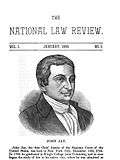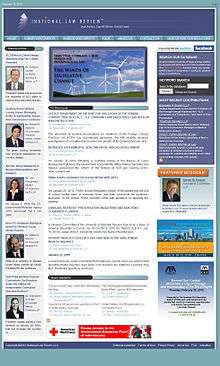The National Law Review
|
The National Law Review, February 2, 2010 | |
| Categories | Law of the United States; Law; Law Journal; Legal periodical; News and Newsmagazine. |
|---|---|
| Frequency |
Monthly (1888- ) Daily (2008- ) |
| First issue | 1888 |
| Company | National Law Forum L.L.C. |
| Country | United States |
| Based in | Chicago, IL |
| Language | English |
| Website | www.NatLawReview.com |
| ISSN | 2161-3362 |
The National Law Review is an American law journal, legal news website and legal analysis content-aggregating database.[1] The site offers news coverage and analysis of recent court decisions, regulatory changes and legislative actions and includes original content and content submitted by various professionals in the legal and business communities. The online version of the National Law Review was started as a research tool by a group of corporate attorneys looking to store and classify useful legal analysis and news they located on the internet. The on-line version specializes in news and analysis for the following types of American law: Administrative law; Banking law; Bankruptcy law; Civil Procedure;Common law; Competition law; Conflicts of laws; Construction law; Consumer Protection; Contract law; Copyright law; Business Criminal law; Cyberlaw; Election law; Energy law; Entertainment law; Environment law; Family law; Financial regulation law; Health law; Immigration law; Insurance law; Intellectual property law; Labour law or Labor law; Military law; Municipal law; Patent law; Product liability; Property law; Securities law; Statutory law, Tort law; Tax Law; Trademark law and Trust law.
History

The National Law Review on-line edition was developed in Chicago, Illinois by corporate attorney Jennifer Schaller and other legal and internet professionals in order to provide an easily accessible and reliable database of articles written by experts analyzing legal news and trends. The National Law Review print edition was founded in 1888 in Philadelphia by legal publishers Kay & Brother.[2]
The print edition of the National Law Review was a monthly scholarly law review which included sections such as Current Legal News, a Book Review section, a Digest of Important Decisions which summarized recent judicial decisions in various states, and a section devoted to Current Legal Thought organized by legal topic.[2] Historically, articles in law reviews were often considered a persuasive authority in American courts, though this influence is generally thought to be waning in recent years.[3] The on-line edition of the National Law Review has been described as more straightforward, practical and informative than a traditional law review, containing information of potential interest to both legal and business professionals [4] and it often serves as a reference source to other legal periodicals[5][6] and as a source on emerging American legal issues to mainstream media.[7]
References
- ↑ Legal Technology Resource Center. "Free Full-Text Online Law Review /Journal Search". American Bar Association. Retrieved 2011-11-14.
- 1 2 "The National Law Review". WorldCat.org. Retrieved 2011-08-14.
- ↑ Adam Liptak. When Rendering Decisions, Judges Are Finding Law Reviews Irrelevant. The New York Times. 19 March 2007.
- ↑ "Law student research paper wins national legal writing contest". The University of Iowa New Services. 22 April 2011. Retrieved 26 November 2012.
- ↑ Johnson, Jen. "Co-Management Agreements, Compensation & Compliance". American Bar Association Health Law Section. Retrieved 2011-08-16.
- ↑ "Estate Planning After 2010:Resources, opinions and suggestions available on the Internet". Trusts & Estates. Retrieved 2011-08-14.
- ↑ "NLRB judge: Employees can bitch about their jobs on Facebook". Thomson Reuters News & Insight. Thomson Reuters News & Insight. Retrieved 2011-09-16.
External links
| Wikimedia Commons has media related to The National Law Review. |
- Official website
- Alexa Website Ranking, an Amazon.com Company /Alexa Internet Web Traffic Ranking
- Quantcast Traffic Ranking /Audience Profile
